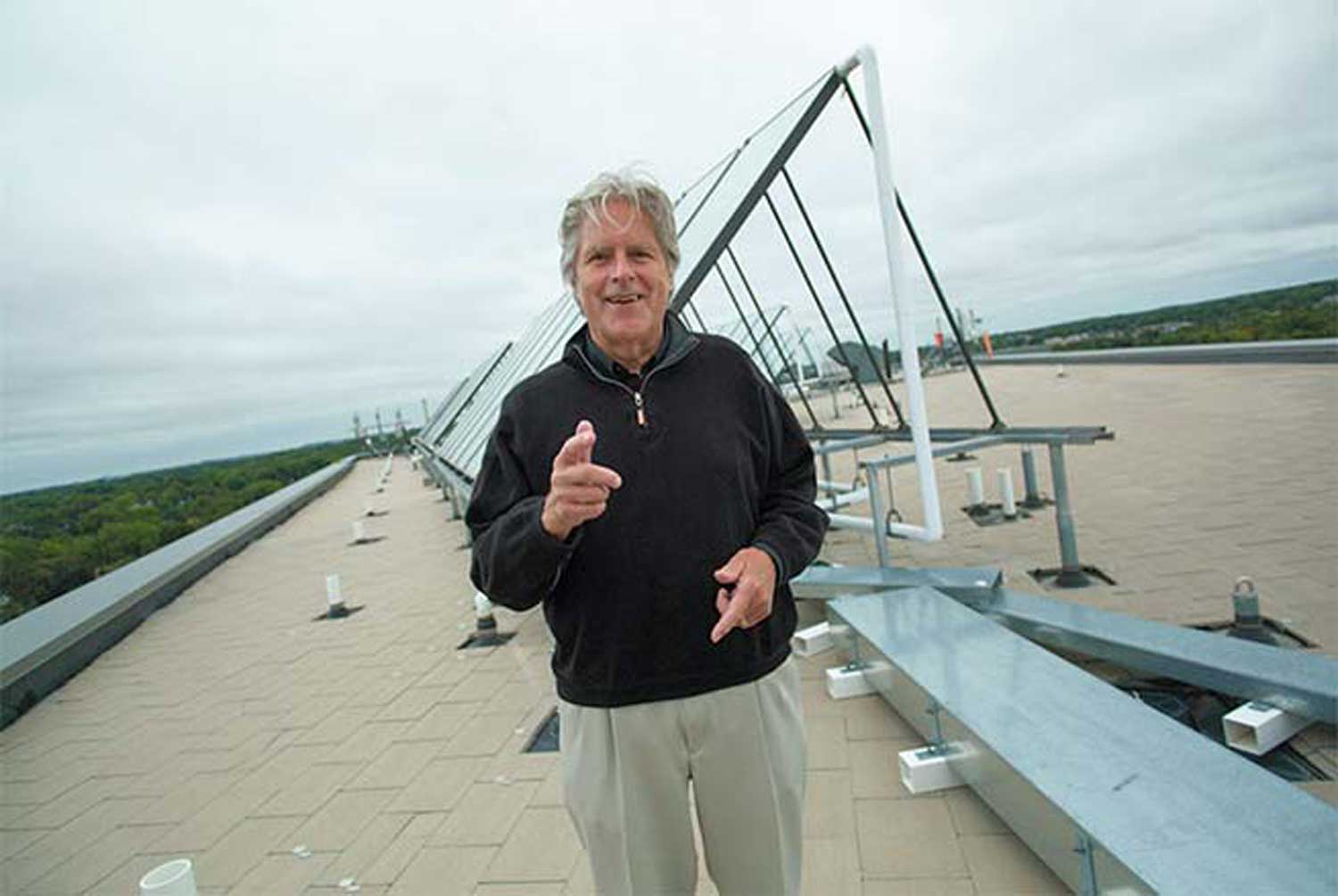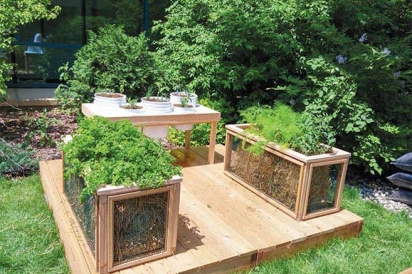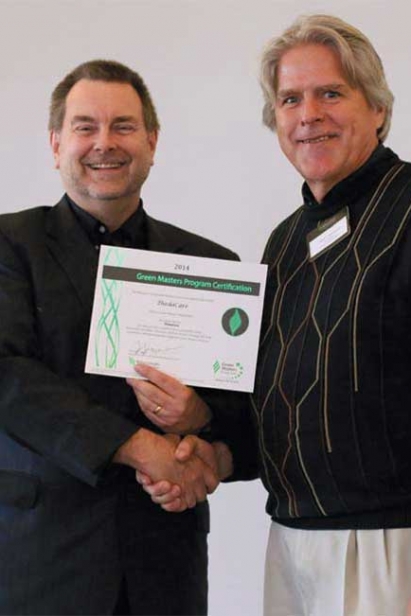ThedaCare Aims to Reduce Carbon Footprint
DRIVEN TO REDUCE HEALTH CARE’S CARBON FOOTPRINT
Sustainability is one of those words that most people love to wrap their arms around. It’s a good word that is generally considered to have positive connotations. Yet, if you asked people what sustainability is many would have a difficult time telling you what it means and how it impacts them. So when Paul Linzmeyer is introduced to people as the sustainability leader at ThedaCare he probably gets a few blank stares.
As Northeastern Wisconsin’s largest health care provider with seven hospitals, 35 clinics and about 7,000 employees ThedaCare certainly knows what Linzmeyer does and what he’s accomplished since taking over the position in 2012.
ThedaCare released information earlier this year indicating the company is on track to recoup a $1.9 million energy efficiency investment when establishing its department and hiring Linzmeyer. New projects worth $1.5 million were scheduled to commence this year and Linzmeyer expects them to be paid off in two years. In short, his department is charged with helping to improve the health of communities by greatly reducing or eliminating ThedaCare’s energy, waste and water footprint. The initiative is now also focused on food.
But it’s highly possible that Linzmeyer’s leadership in producing such impressive results may not have happened except for a cold day on the Fox River. What brought Linzmeyer and ThedaCare together were circumstances that challenged Linzmeyer’s will to live and the recovery that followed. It was while sitting along that river that Linzmeyer observed an eagle, who’s determined attempts to find food in the limited open water that surrounds the Wisconsin Public Service power plant, that “rejuvenated me,” said Linzmeyer.
Diagnosed with stage three rectal cancer in 2011, Linzmeyer’s renewed fight not only served to defeat a dreaded disease but also refueled his drive dedicated to a cleaner world and healthier workplace.
Well before his illness, Linzmeyer could see a better world through what could only be described as a stew of educational pursuits that ranged everywhere from philosophy to microbiology. He finally settled on a degree in English at the University of Wisconsin-Green Bay. Go figure.
But when you sit down over a cup of coffee with Linzmeyer, it’s not the degrees but the collection of knowledge both in the classroom and on the job that has served him well.
Before his illness, Linzmeyer had already spent 35 years as a “business activist” implementing innovative approaches in his leadership positions to carve out a reputation as an internationally recognized authority on healthy and sustainable business practices.
There’s that sustainable word again and when asked what it means to him, he draws on the wisdom of our earliest inhabitants.
“There’s an old Native American saying,” said Linzmeyer. “It states that we don’t inherit our land from our ancestors but rather borrow it from our children.” In short, “we need to think out 50 years instead of three to fi ve,” he adds. “It’s a leadership thing.”
And that leadership doesn’t have to come from the boardroom, but from anyone willing to participate in what clearly is a team effort.
Those ideas primarily came to the forefront under Linzmeyer’s leadership at Bay Towel in Green Bay, a job he took in 1994 after returning to Northeastern Wisconsin after heading up companies in San Francisco, Chicago and Denver.
“It was the first time I had to buy heath insurance,” he remembers, faced with a considerable outlay of money for a business of 200 employees. Realizing food plays a huge role in affecting health care trends, Linzmeyer hired a dietician. But rather than simply see what a healthier lifestyle could mean for his employees and his health care costs, he went further out into the community.
Borrowing from his practices in his previous position with GK Services in which 100,000 meals were served through his Operation Food Share initiative, Linzmeyer confounded some of his business colleagues by providing free clinics.
When he was asked when he had the time to produce these kind of programs he told people “I don’t have the time not to do that.”
He wanted his company to not only be known for its community outreach but also its sustainability practices and in 2008 its carbon footprint was recognized as being the smallest in the country.
The United States Secretary of Commerce took notice and approached Linzmeyer to learn more about his efforts economically, socially and environmentally. Clearly impressed, Linzmeyer was a U.S. Department of Commerce delegate at an Organisation for Economic Cooperation and Development (OECD) policy meetings in Paris, New York City and many other cities around the globe. At the time Linzmeyer was a founding partner in ISO International LLC, a consulting fi rm built on his previous experiences. But all that changed in early 2011.
“I’d never been sick a day in my life,” he said. “When you’re sick you have a lot of time to think.”
He also had time to observe and he realized just how much waste was going on in health care in terms of material, food and human potential.
His decision upon regaining his health, “I’m going into health care,” he said. He was hired by ThedaCare and over the past three years “our job is to thoughtfully use resources to meet current needs without borrowing from the future generations,” said Linzmeyer, re-emphasizing the mission of sustainability he’s borrowing from the Native Americans. “By definition, sustainability in health care is not simply an effort to save the planet; rather, we are acting as advocates for better human health. Our goal is to think more widely and deeply about the impact of our decisions about energy, material waste, water usage and food production and consumption.”
One of a number of examples is decomposing food waste and compostable dinnerware at an accelerated rate using environmentally friendly microorganisms. The process produces gray water that can be used to scrape dinnerware, saving one million gallons of water annually.
“Everybody has to eat,” said Linzmeyer, whose focus has expanded to a healthier, sustainable and locally-produced food source. “Food is fun and social but it’s not just three pizzas for $10.”
Combatting what Linzmeyer feels is a huge carbon footprint in Wisconsin when it comes to the disproportionate amount of food grown for animal consumption, ThedaCare has jumped head first into the Northeastern Wisconsin Food Hub.
It’s a collaborative effort between Goodwill Grows, Live 54218 in Brown Country and re:TH!NK in Winnebago County. ThedaCare buys food through the Food Hub for use in its hospital cafeterias.
“Freshness, texture and taste are all critical,” said Linzmeyer, referring to enhancing the hospital culinary experience that sometimes hasn’t always gotten good marks.
But when purchasing at the volume ThedaCare is capable of it can affect the entire farm-to-table dynamic.
“We’re trying to grow the number of local growers,” said Linzmeyer, who insists the Hub will not only ultimately improve the health of patients, employees and visitors at ThedaCare but the local economy as well with a demand for more growers.
“Health care can use the capitalistic system to foster change,” he said.
ThedaCare is now growing its own produce. The idea of a raised garden began with Linzmeyer visiting IntelliGrowth in Appleton. His hope was to build a quality community garden using property owned by ThedaCare. An introduction to his vision quickly led to a visit to Fox Valley Technical College in Appleton to see how FVTC was growing a wide variety of flowers and vegetables in raised beds. That blossomed into what has taken place in the courtyard at the Appleton Medical Center. A larger one-acre plot of garden is located across the street from the Neenah hospital. “All you have to do is cross the street,” said Linzmeyer. These are examples of local initiatives that are taking root nationally. Linzmeyer has seen the movement from both an international and local perspective as well as from someone who has been healthy and in the midst of illness.
Illness can get you thinking about your legacy and while Linzmeyer had pretty much cemented his reputation for a better and healthier world before his brush with death, he came away even more dedicated to foster a better world for future generations. Such is sustainability.






